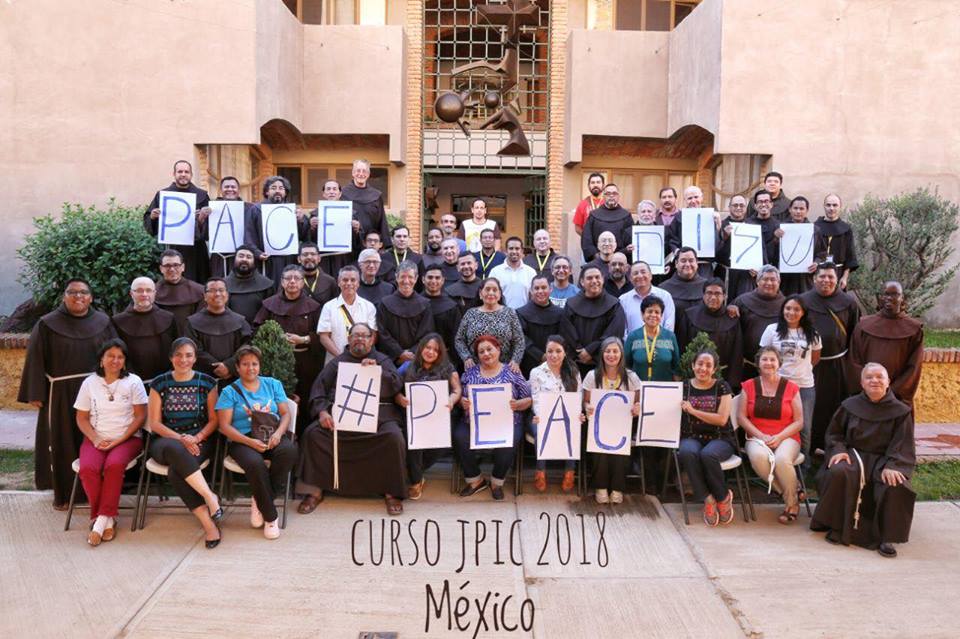From April 9 to April 16, approximately 55 Franciscan friars and lay partners in ministry gathered in Guadalajara, Mexico to participate in the OFM JPIC Office’s international course on migration. The annual course was organized by Jaime Campos, OFM and Rufino Lim, OFM and sought to present the issue of migration holistically while serving as an orientation for the Order’s new JPIC animators.
Entitled Migration: Causes, Walls, and Franciscan Perspectives, the course was divided into three parts. The first part focused on root causes and drivers of human mobility. Gerardo Cruz Gonzalez, from El Instituto Mexicano de Doctrina Social Cristiana (IMDOSOC), provided a comprehensive socio-political history of migration in the Americas and offered six theoretical approaches to analyze this phenomenon. For Mr. Cruz Gonzalez, a critical understanding of the history of migration is important in order to provide Franciscans not only with a recollection of the past but also with the tools to help in our resistance against injustice.
Rafael Alonso Hernández López, the director of FM4 Paso Libre, a migrant shelter in Guadalajara, presented on the impact of “Social, economic, political violence and climate change” on migration while Melissa Angélica Vértiz Hernández, of the Working Group on Migration Policy, presented on inequality as a primary driver of migration (“The unfair distribution of wealth: Social inequality”). Extreme poverty, political corruption, climate change, and other injustices join to create a deadly mixture of violence and dehumanization that forcibly displaces peoples in vulnerable situations.
For Mr. Lopéz, the situation of migrants all over the world is a critical issue that must be addressed on a global scale: “Similar problems that arise in different places demand answers that will have to go beyond the local scope. Migration is constituted in many of these scenarios as an act of survival, an escape from the debacle of nation states and their policies of economic development and armament, from the absence of minimum requirements of a healthy coexistence, and from non-interest in containing and eradicating violence, poverty, and marginalization.”[1]
The second part of the JPIC course focused on “walls” – both physical and metaphoric – that act as barriers in the migration process. Fray Tomás González Castillo, OFM, founder of La 72 and a partner of Franciscans International, gave an overview of the legal and political hurdles that inhibit migration in Mexico, as well as the xenophobia, fear, and prejudice that undergird these policies (“Physical and symbolic walls”). Fray Tomás noted that various initiatives, such as the Programa Especial sobre Migración and the Programa Frontera Sur, have been proposed by the Mexican government with the intention of protecting the human rights of migrants who transit through the country. These programs, however, have failed to protect the rights and safety of migrants – on the contrary, they have increased border security through militarization and have caused a surge in violence and illegal activities along migratory routes, such as trafficking and extortion, as well as physical and sexual assault.
Pointing to the dangers facing migrants from Central America, Fray Tomás offered some challenging words: “Mexico is a minefield for anyone who crosses its borders as an ‘irregular migrant’. Mexico is a transversal wall that one has to jump, a gigantic clandestine grave where we can find the remains of those who were able to jump this invisible wall but who have fallen into the hands of criminals.”[2]
The last part of the course highlighted Franciscan perspectives and responses to migration. Rooted in the spirituality of Saint Francis of Assisi, the presenters focused on Franciscan themes, such as minority, human dignity, and the common good. Ethicist Martin Carbajo, OFM from the Pontifical University Antonianum and Juan Rendón, OFM from Fundación Franciscana Santo Tomás Moro in Colombia explored the various ways in which our Franciscan charism calls us to respond to global migration.
As Franciscans International works to ensure that human rights remain at the center of migration policy at the United Nations, especially in regard to the Global Compact for Safe, Orderly and Regular Migration, the OFM JPIC course provided a good snapshot of Franciscan engagement with migration at local, national, and regional levels. Fray Martin said, “Franciscans join all of humanity and all of creation to celebrate together the joy of living, while actively preparing the new heavens and the new earth.”[3] In other words, just as Franciscans work to spread the joy of the Gospel, we are also called to remain steadfast in our commitment to justice and peace, to defend and promote the human rights and dignity of our migrant and refugee brothers and sisters, and to protect the earth, our common home.
Br. Christian Leo Seno, OFM
JPIC Team – NY, USA
[2] “México es un campo minado para todo aquel ser humano que atraviese sus fronteras como ‘migrante irregular’. México es un muro transversal que se tiene que brincar; México es una gigantesca fosa clandestina donde encontramos los restos de aquellas y aquellos que han podido brincar ese muro invisible, pero han caído en las manos de los criminales.”
[3] Los franciscanos se unen a toda la humanidad y a toda la creación para celebrar juntos la alegía de vivir, mientras preparan activamente los cielos nuevos y la nueva tierra.

